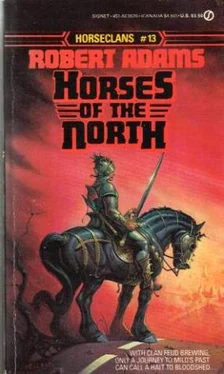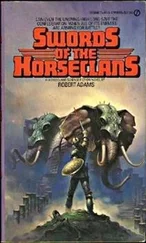The huge stallion beamed renewed assurances of undying love and adoration for the girl and added solemn assurance that he would stamp the life out of anything on two legs or four or none that ever offered her harm. He meant it and she knew it.
The two old friends, Colonel Ian Lindsay and Director Emmett MacEvedy, were indeed deeply worried, and with excellent reason. So hard had they been hit, so badly had they suffered, that even the worst of MacEvedy’s predictions had been more than surpassed in actuality. Only some two hundred men, women and children still were alive in all of the fort-station complex, and not a few of those were ill or convalescent, a convalescence lengthened by the poor and scanty rations available to them all these dark days.
The last of the seed grain was long since consumed, along with every last scrap of canned or otherwise preserved foods. Not a single chicken was left, nor any pigs; the rabbit cages gaped empty, as too did the commodious stalls of the shire horses, most of them. The director was now fearful of allowing the slaughter of any more cattle or sheep, lest there be no breeding stock left when once this string of calamities had at last come to an end; however, unless a way could be found to replace the almost expended silage, it might be a hard choice of slaughtering the last of the kine and the horses or of just watching them starve to death. He never, of course, considered surrendering his stock to the besiegers any more than he would have thought of turning over to them his wife or his children.
These days, they all were subsisting on fish from the river, herbs and mushrooms cultivated within the walls and those wild plants gathered from the nearer fields where the riflemen on the walls could keep reasonably safe from the prairie rovers the hardy souls who had agreed to go outside.
This past spring, they had had none of the usual crop or animal surpluses for the trader caravan. Rather had they had to trade metal for all of the jerky the traders would trade, and not enough value had been left of that transaction to obtain any of the needed brimstone, so the supply of gunpowder now was become desperately low. Nor were they overly well supplied with lead for bullets, though Ian Lindsay seemed to think that certain other metals still available—notably, pewter—might be utilized in a real emergency.
The director laughed to himself at the memory of his old friend’s words, as if there could be an emergency any more real and pressing than their present straits.
A flurry of shouts and the sounds of fast-moving feet made him arise from his desk and stride to his office door just as a fist smote its panels in a staccato knock. He opened it to a red-faced soldier.
After a smart salute, the sweaty man said, “Sir, Colonel Lindsay’s compliments. He would have the director at his office as soon as possible. A prairie rover is riding in alone under a white flag.”
Guided by Scott warriors familiar with the territory to be covered, the Kindred scouts had not been long in returning from the two other fords, but their news had run from bad to worse.
“The ford downstream, to the east, some twenty-two or so miles from this place,” Subchief Airuhn Lehvee had informed the tribal council, “is narrow and full of potholes and fissures, and the current is very swift. We could use it—I have crossed worse, I admit—but it will be very slow and we will lose stock, maybe wagons and Kindred, too. It will likely be better, think I, to use this other, upstream ford that was mentioned, rather than to waste so much time and take so much risk as use of the one I just scouted would entail.”
But old Chief Gaib Hwyt shook his head. “Would that we had that option, Kinsman, but I fear it is either that dangerous, treacherous ford you scouted or none. The scouts who rode northwest came back to report that at sometime since this time last year the river changed course up there. There now is no ford, only deep, fast-flowing water in a new bed. So we just must move downstream, to the east, and chance yours, I suppose. There is nothing else for it.”
“There just might be, Gaib. Don’t be too hasty in this very important matter.”
The old man turned his head. “You have advice for the council, Uncle Milo? Ever is your sage counsel welcome and heeded by us, your own Kindred.”
It had not been all that easy, of course. Gus Scott had had to be convinced that something might be accomplished to satisfy the vengeful ends of him and his people, and in hopes of effecting that purpose, Milo had had the Kindred throw a feast to which the non-Kindred nomads had been invited.
Life was hard, almost unremittingly hard, for the cattle-, goat- and sheep-herding nomad peoples of the prairies and plains. Summers were hot and dry and harbored the near constant threat of horizon-to-horizon fires, which could wipe out entire tribes and their herds; autumn was usually only a continuation of the summer until suddenly, like as not catastrophically, winter swept down to envelop the lands and all upon them in its icy, relentless grip.
Winter was always the hardest, most deadly season to man and beast, and each succeeding one took some toll of life, mostly of the aged, the very young or the sickly, but sometimes, entire encampments would be wiped out. And even the natural rebirth of spring could bring along with its warmth the peril of flooding.
Hunting, which occupation provided a large proportion of a nomad’s meat, could be a deadly dangerous affair, and each year took its own toll in deaths and maimings and a full gamut of injuries. Nor were even mundane pursuits really safe, for horses, mules and cattle are none of them noted as among the more intelligent quadrupeds and their native denseness when combined with unreasoning fear and their inherent strength had cost more than one nomad his life.
It was because their day-to-day life was so hard, regardless of the season or the weather, that these people seldom rejected a chance for some pleasure or recreation and imbibed of it in long, deep drafts. Consequently, the invitation of the Ehlai-Kindred tribe was received no less joyously for the gravity of the acceptance speeches of the various chiefs, subchiefs and warchiefs approached. Preparations immediately commenced for a gala two to three days’ revel, with the finest items of clothing, weapons and equipment being unpacked, cleaned, polished and refurbished. Favorite mounts were groomed until their hides were all agleam, for personal and tribal honor and prestige demanded a good and impressive showing of chiefs and warriors, in particular.
Most large game and much of the smaller had, of course, been killed off or frightened away within the immediate environs of the besiegers’ camps, so the Kindred had to ride far, far out to secure provender for the feasting, but find it they did. The various parties brought back numerous deer of varying sizes, a couple of fat bears, wild swine, stray caribou and a brace of some deerlike ruminant with unusual, unbranched horns.
It was the hunting party accompanied by Milo, however, that chanced across the true oddity, a highly dangerous seven days’ wonder.
It was a hunter named Bili Gawn who first found the singular tracks and led the rest of the party to the muddy streambank in which they had been pressed.
Milo and the rest squatted about the huge hoofprints.
“They look no whit different from any herdcow’s,” remarked one of the hunters, “but for the size and the depth of the print. By Sun and Wind, Uncle Milo, the beast must weigh as much as two or three of our biggest bulls. What do you suppose it can be?”
Milo shrugged. “There are two ways to find out. One is to try to track it, but away from this soft ground, out there on the open prairie, it might be a task easier spoken of than done. The other would be to hunt as usual this day long, then arrange to be here when it comes back to drink. But what think you, Bili? You’re the best tracker, by far.”
Читать дальше












